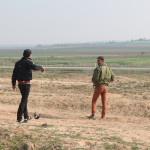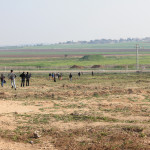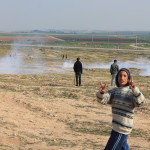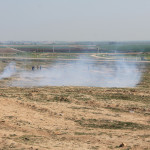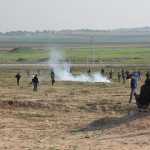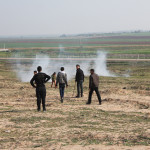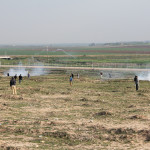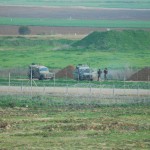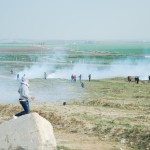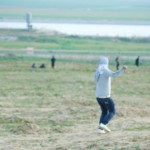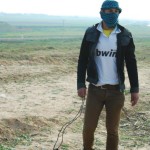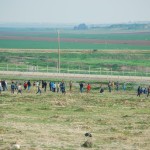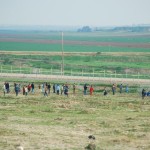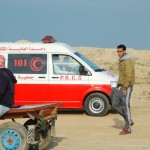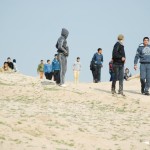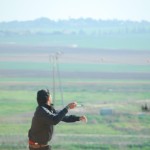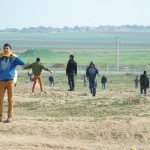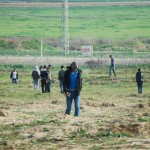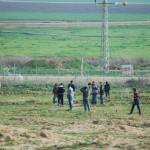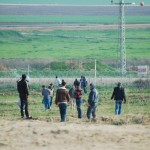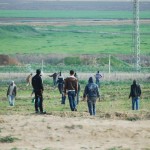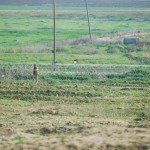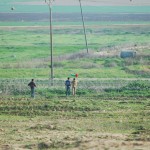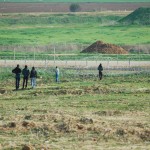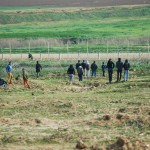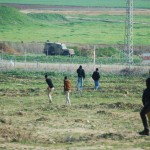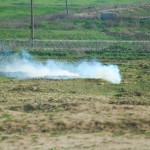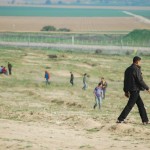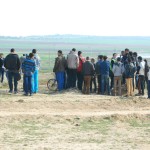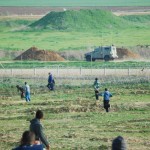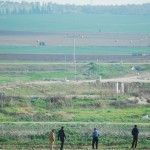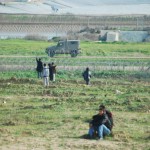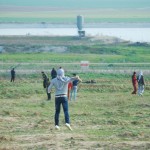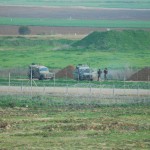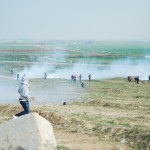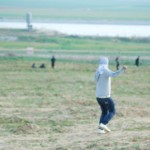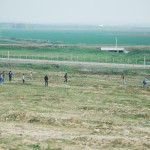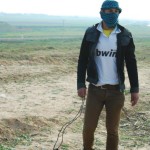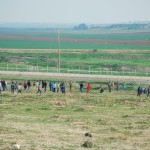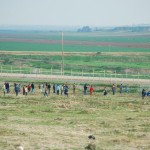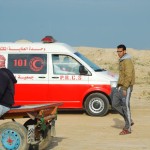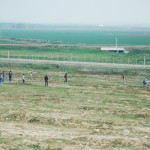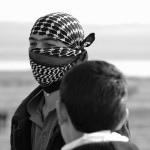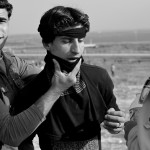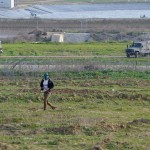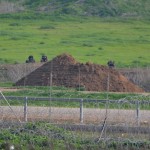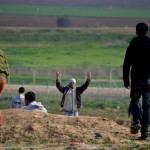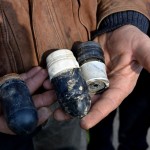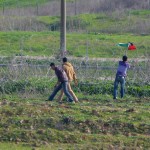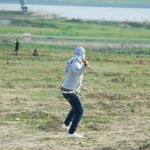10th February 2014 | International Solidarity Movement, Rosa Schiano | Gaza, Occupied Palestine
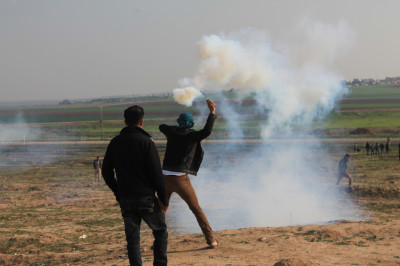
On Friday, 7th February, hundreds of Palestinian youth joined a weekly demonstration of popular resistance along the separation barrier east of Jabaliya, in the northern Gaza Strip.
Aware of attacks by the Israeli army, many were equipped with onions, water and yeast to relieve the pain of tear gas.
Palestinian youth between ten and 24 years old gather there to challenge the Israeli military occupation, approaching the separation barrier, throwing stones or placing Palestinian flags on the fence.
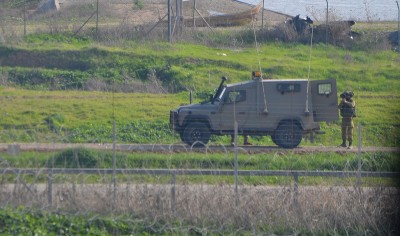
Placing a Palestinian flag on top of the barrier that separates the Gaza Strip from the lands Israeli occupied in 1948 is a victory that worth life for many.
The Israeli army deployed Jeeps along the barrier. Three soldiers hid behind a small hill, pointing guns at the protesters. Some other soldiers came out of a Jeep and shot bullets and tear gas.
The wind was in protesters’ favor, the reason the tear gas did not initially hit them. Later, the Israeli army fired tear gas a long distance over demonstrators so all were surrounded by it. Many youth started to run, looking to the sky to avoid being hit by the canisters. The gas burned the eyes and lungs.
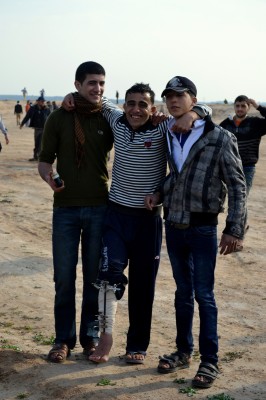
“We are here to liberate Jerusalem and affirm the right to our land,” a young man said.
The protest was also attended by two young men wounded in previous demonstrations. One of them, on crutches, had an external fixator in his right leg. He had a big smile, despite everything.
The tension rose as time passed, and soon the tear gas was replaced with more bullets.
An ambulance reached the area shortly afterward.
At the end of the, day five youths were wounded, three by gunfire and two by tear gas.
Nizar Mahey El Dein Zaqout, age 23, was hospitalized at Kamal Odwan hospital in Beit Lahia. He suffered from a gunshot wound to his left knee that caused a fracture and from shrapnel. He underwent surgery the next morning and will remain under observation for control of his nerves.
Nizar had placed a Palestinian flag over the separation barrier and a soldier shot him. Some youth carried him to the ambulance.
The next morning in the hospital, he said he had risked his life “Because this is our land. Jerusalem belongs to us. They live in our land against our will.”
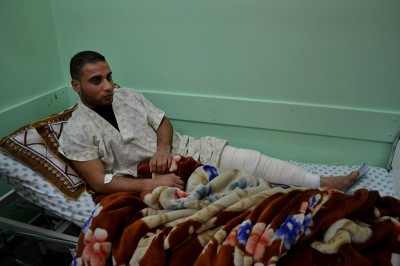
Nizar also attended the protest also the previous Friday, when he was injured by tear gas.
His cousin Mahmoud Zaqout, age 19, was killed two years ago on 30th March during the Global March to Jerusalem near the Erez checkpoint in the northern Gaza Strip. Mahmoud had been shot while trying to place a Palestinian flag on the separation barrier.
Nizar said he will continue to go to these protests, which began again in Gaza about two months ago. He added that for about six weeks, the demonstrations have become more aggressive.
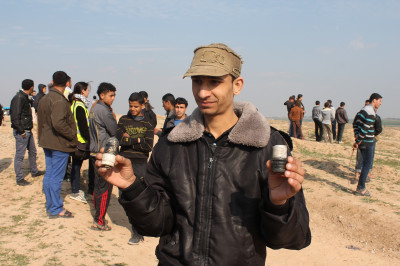
“I could become a martyr fighting for the liberation of Jerusalem and to open a line between the Gaza Strip and the West Bank,” he said. “We also demonstrate for the rights of Palestinian women detained in Israeli jails.”
Ali Ziad Salim Abu Dan, age 19, was seriously injured and hospitalized in the intensive care unit at al-Shifa hospital in Gaza City. His father Ziad said that the bullet entered the chest and affected the heart and liver, at a distance of a few millimeters from the spine. His son arrived at the hospital in a coma, waking up the next day. He was hospitalized in the ICU with artificial ventilation. The last from his father on Sunday night reported that his condition was improving and he was breathing without ventilation.
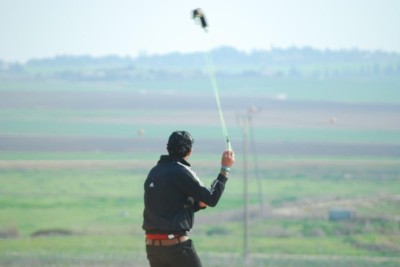
Ahmad Mahmoud Al Najjar, age 23, was hit by a bullet in the right leg. His bones were not fractured and he was released from the hospital.
The other two youth, injured by tear gas, were released from the hospital.
Many of these youth risk their lives because they believe in the liberation of their land, and become martyrdom means to be remembered for having fought bravely for it.
Some of them likely risk their lives in part because they are desperate. Their life conditions, the siege, and unemployment do not give them any hope for the future.
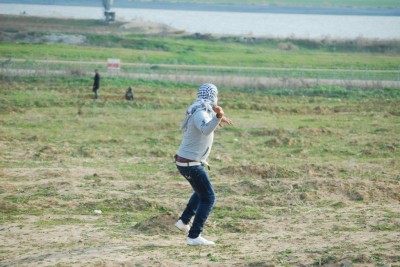
ISM will continue to be witnesses, as Nizar asked, to give these youth a voice and be close to them in the fight for their rights, because the Palestinian issue is not only a humanitarian cause but also a political one.


